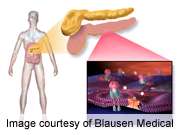Weight gain is higher in patients with type 2 diabetes mellitus who receive more intensive glycemic control treatment and is associated with a reduction of A1C from baseline, according to research published online Feb. 14 in Diabetes Care.
(HealthDay)—Weight gain is higher in patients with type 2 diabetes mellitus (T2DM) who receive more intensive glycemic control treatment and is associated with a reduction of A1C from baseline, according to research published online Feb. 14 in Diabetes Care.
Vivian Fonseca, M.D., of Tulane University's Health Sciences Center in New Orleans, and colleagues studied the determinants of weight gain in 8,929 patients with T2DM from the Action to Control Cardiovascular Risk in Diabetes trial who either participated in standard (4,504) or intensive glycemic control treatment arms (4,425).
The researchers found that patients in the intensive glycemia arm gained an average of 2.7 kg more than those in the standard arm (3.0 versus 0.3 kg). Independent factors associated with weight gain over the two-year treatment duration included younger age, male sex, Asian race, no smoking history, high A1C, baseline body mass index of 25 to 35 kg/m², high waist circumference, baseline insulin use, and baseline metformin use. Overall, medication use was associated with less than 15 percent of the variability in weight change.
"Following randomization, the intensive group participants with the greatest reduction in A1C gained the most weight," the authors write. "Insulin and TZD [thiazolidinedione] use was associated with the greatest weight gain. Nevertheless, appreciation of these characteristics may help develop strategies to prevent weight gain when initiating intensive glycemic control in the future."
More information:
Abstract
Full Text (subscription or payment may be required)
Journal information: Diabetes Care
Health News Copyright © 2013 HealthDay. All rights reserved.























